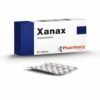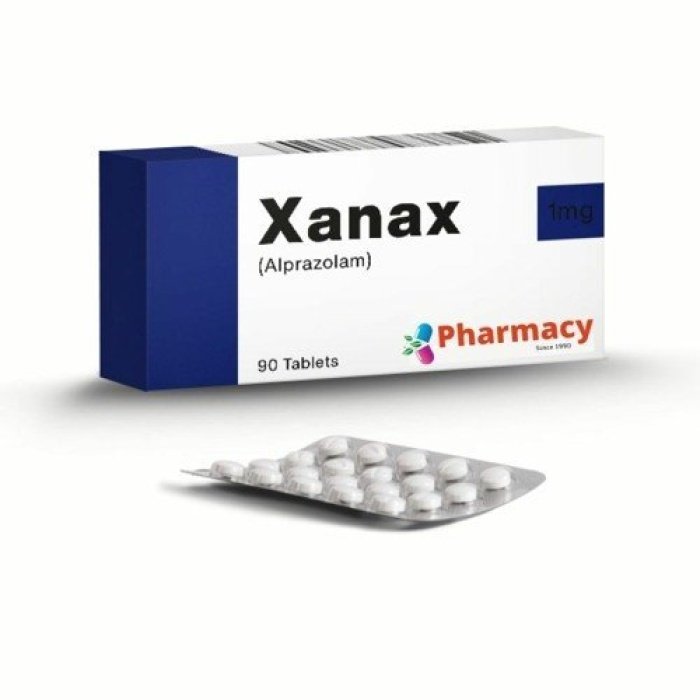Xanax 1mg
$299.00 – $549.00
Compare+1 (862) 505-1407 Start Live Chat
Description
What is Xanax 1mg?
Xanax, the brand name for the drug alprazolam, belongs to a class of medications known as benzodiazepines. These pharmaceutical agents are commonly prescribed for their anxiolytic properties, which means they are effective in reducing anxiety. By influencing the central nervous system, Xanax acts on the neurotransmitter gamma-aminobutyric acid (GABA), enhancing its calming effects. This mechanism is crucial as it helps to alleviate the heightened neuronal activity that underlies anxiety and panic disorders.
Alprazolam is particularly known for its efficacy in treating anxiety disorders, including generalized anxiety disorder (GAD) and panic disorder. Patients suffering from these conditions often experience debilitating symptoms that impact their daily lives, making medications like Xanax vital for management. The relief provided by alprazolam helps to improve the overall quality of life for individuals coping with anxiety-related challenges.
It is important to understand that Xanax is a prescription medication, indicating it should only be used under a healthcare provider’s guidance. Prescribing this medication necessitates a comprehensive assessment of the patient’s health status and a thorough consideration of the potential benefits versus risks involved in its use. While Xanax can be highly effective for short-term management of severe anxiety and panic attacks, there are concerns regarding dependence and withdrawal symptoms, particularly with prolonged use.
Moreover, awareness of potential side effects is essential for anyone considering this medication. Common side effects may include drowsiness, dizziness, and fatigue, which necessitate caution, especially when engaging in activities that require alertness, such as driving. Understanding the purpose and function of Xanax as a therapeutic agent underscores the importance of responsible use and the necessity of regular consultations with healthcare professionals. This knowledge empowers patients to make informed decisions about their treatment options.
Common Uses and Dosage of Xanax 1mg
Xanax, known generically as alprazolam, is a medication often prescribed for the management of anxiety disorders, primarily generalized anxiety disorder (GAD) and panic disorder. This benzodiazepine works by enhancing the effects of a naturally occurring neurotransmitter in the brain called gamma-aminobutyric acid (GABA), which helps to produce a calming effect. Xanax 1mg is a commonly prescribed dosage, particularly for patients requiring a moderate level of medication to manage their symptoms effectively.
For individuals diagnosed with GAD, Xanax serves to alleviate excessive worry and tension that might interfere with daily activities. In cases of panic disorder, where sudden and recurrent panic attacks can severely disrupt one’s quality of life, the medication aids in reducing both the frequency and severity of these episodes. Medical professionals emphasize the importance of personalized treatment plans, which may include different dosages tailored to the individual’s specific condition, response to treatment, and overall health profile.
The standard starting dose of Xanax can vary significantly, and the 1mg dosage is often utilized once a patient has been assessed for the appropriate level of intervention. Depending on the patient’s response, doctors might adjust this dosage, ensuring optimal management of symptoms while minimizing potential side effects. It is critical for patients to adhere to the prescribed dosage regimen and to communicate regularly with healthcare providers about the effectiveness of the medication and any side effects encountered. Misuse of Xanax, including self-adjusting dosages without professional guidance, can lead to dependency or other serious health risks. Following a doctor’s instructions is paramount for safe and effective treatment with Xanax.
Potential Side Effects and Risks
Xanax 1mg, primarily prescribed for the treatment of anxiety and panic disorders, can present a variety of side effects that patients should be aware of. Commonly reported mild effects include drowsiness, dizziness, and fatigue. These symptoms may arise as the body adjusts to the medication. While generally manageable, they can impact daily activities, particularly those requiring full alertness, such as driving or operating machinery.
As with many medications, the risk of more severe side effects cannot be overlooked. Some individuals may experience increased heart rate, confusion, or memory problems. These symptoms can signify a more serious reaction and warrant immediate medical attention. Furthermore, one of the most significant concerns with Xanax is its potential for addiction. Benzodiazepines, including Xanax, have a risk of dependence, particularly when used for extended periods or at higher doses than prescribed. Patients may find themselves needing larger amounts to achieve the same therapeutic effects, leading to a cycle of misuse.
Withdrawal symptoms also pose a considerable risk when discontinuing Xanax, particularly if it is done abruptly. Symptoms can range from mild anxiety to severe seizures, underscoring the importance of a supervised tapering approach. Moreover, interactions with other medications can exacerbate these risks, making it crucial to disclose all medications, both prescription and OTC, to healthcare providers before starting treatment with Xanax.
In essence, while Xanax 1mg can be an effective solution for anxiety management, the potential side effects and inherent risks necessitate its use under strict medical supervision. Understanding these aspects can help ensure patient safety and foster responsible medication practices.
The Importance of Proper Use and Guidelines
Xanax, or alprazolam, is a medication commonly prescribed for anxiety and panic disorders. However, the effectiveness and safety of Xanax 1mg depend heavily on its proper use. It is crucial for patients to adhere to the prescribed guidelines and dosage instructions provided by their healthcare professionals. A missed dose may lead to a resurgence of symptoms, and thus it is recommended to take the missed dose as soon as remembered, unless it is almost time for the next scheduled dose. In such cases, the missed dose should be skipped, and the regular dosing schedule should resume. Patients should avoid taking extra medication to compensate for a forgotten dose, as this may increase the risk of side effects.
Before starting Xanax, individuals should discuss their complete medical history with their healthcare provider to assess any potential risks or interactions. Certain medical conditions, such as liver disease or respiratory issues, may require adjustments in dosage or alternative treatment options. Additionally, sharing information about other medications, including over-the-counter drugs and supplements, is vital to prevent adverse reactions.
It is essential to understand that abruptly discontinuing Xanax can lead to withdrawal symptoms, including increased anxiety, restlessness, and seizures. Therefore, gradual tapering of the medication under medical supervision is recommended for those who wish to stop taking it. Healthcare providers play a fundamental role in monitoring patients’ responses to Xanax, adjusting dosages as necessary, and addressing any concerns that arise. Regular follow-up appointments are critical for evaluating the effectiveness of the treatment and ensuring the patient’s overall well-being during the course of therapy.
Alternatives to Xanax and When to Seek Help
As mental health treatment continues to evolve, various alternatives to Xanax are available for those managing anxiety and panic disorders. When exploring treatment options, it is important to consider a multifaceted approach that goes beyond medications. Cognitive-behavioral therapy (CBT) is often a primary choice, as it equips patients with coping mechanisms and effective strategies to modify negative thought patterns. Research shows that CBT can be as effective as pharmacological treatments, and it provides skills that promote long-term resilience.
In addition to therapy, lifestyle changes can play a significant role in alleviating anxiety. Regular physical activity, a balanced diet, and sufficient sleep are critical components of mental health. Exercise, for instance, has been shown to boost endorphins and reduce stress levels, acting as a natural anxiolytic. Furthermore, mindfulness practices such as meditation and yoga can cultivate a sense of calm and present-moment awareness, contributing positively to one’s mental state. Developing a consistent routine that incorporates these practices can be particularly beneficial in reducing symptoms of anxiety.
For those who may not respond well to Xanax or prefer alternative medications, several options exist. Selective serotonin reuptake inhibitors (SSRIs) such as sertraline or escitalopram are frequently prescribed for anxiety, serving as a long-term solution without the risk of dependency associated with benzodiazepines. Herbal remedies, such as valerian root or chamomile, and supplements like omega-3 fatty acids can also provide support, though individuals should consult healthcare providers before initiating any changes.
It is vital to recognize signs that indicate when professional help may be necessary. Persistent feelings of anxiety, panic attacks, difficulty functioning in daily life, or thoughts of self-harm necessitate prompt medical attention. By proactively addressing these concerns and exploring alternative treatments, individuals can effectively manage anxiety and improve their overall quality of life.
Additional information
| Pills | 180, 60, 90 |
|---|






Reviews
There are no reviews yet.